IF ONLY SINCERITY MEANT SUCCESS
You really want this play to work. It means so well and maybe so much. But it’s hard to find a worthy resolution in a play about repeated, nation-wide violations of human rights. Maybe that’s the point. But it’s no dramatic advantage. The optimistic title of truth and reconciliation, now in a U.S. premiere by Chicago’s Sideshow Theatre Company, alludes to the fault-finding and forgiveness-bestowing commissions set up in recent years to adjudicate crimes’”no, atrocities’”against humanity. Collectively, these post-war tribunals have become a play.
No question, it’s an honorable but daunting task that debbie tucker green (she does not, it seems, like capital letters) sets for herself. In only an hour she will depict the ugly aftermath of five still-simmering struggles across two decades: South Africa (1998), Rwanda (2005), Bosnia (1996), Zimbabwe (2007), and Northern Ireland (1999). “J’accuse!”
The seminal setting of Jonathan L. Green’s concentrated staging is a battered waiting room. The graffiti-scrawled walls of this threadbare chamber name conflict zones and bear half-finished slogans of protest. Here 22 actors solemnly enter in silence, sit on the benches and wait’”presumably for justice or at least a hearing.
Successive running scenes detail encounters among these victims of genocide, ethnic “cleansing,” local Holocausts, civil carnage, what have you. The characters’ names are fittingly generic: South African Nana; Zimbabwean Wife; Northern Irish Woman A. No one testifies but many, confronting no-longer-faceless enemies at too-close quarters, accuse. Their very believable reactions run the gamut from crushed resignation to retributive defiance to desperate bargaining to persisting fear. Several refuse to sit down, as if that meant acceptance of their irreparable loss.
Truth may be present in these cryptic snippets but reconciliation certainly is not. No, not even in the final most affecting encounter between a young South African daughter (Almedia Lee Exum) and the South African cop (Sam Guinan-Nyhart) who destroyed her family, firing 16 rubber bullets to prove his valor against unarmed civilians. With perverse honesty, this scene too ends in an impasse.
No apologies get accepted here, no sentences pronounced, and, happily, no forgiveness proffered since it can only come from the dead (or, if you believe, God). It’s enough, the playwright assumes, to bear witness. Sadly, since no scene lingers long enough to achieve momentum, let alone meaning, even in a mere 60 minutes the calamities begin to seem interchangeable. The vignettes get immured into a kind of theatrical “wailing wall.” Plus the plethora of thick foreign accents creates its own “fog of war.”
Considered with pragmatic harshness, maybe this is as much justice as a play can offer. No more than nations, audiences have no right to mistake ignorance for innocence. But in green’s irony-drenched search for “truth and reconciliation,” we haplessly observe too much “before” and not enough “after.” This all-accusatory one-act is not an exercise in futility’”but it sure feels like one.
photos by Jonathan L. Green
truth and reconciliation
Sideshow Theatre Company
Victory Gardens, 2433 N. Lincoln Ave.
Thurs-Sat at 7:30; Sun at 3:00
ends on April 16, 2017
for tickets, call 773.871.3000 or visit Victory Gardens
for more shows, visit Theatre in Chicago
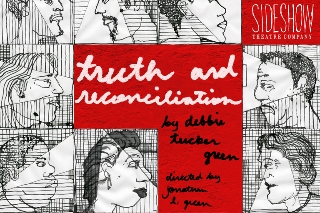
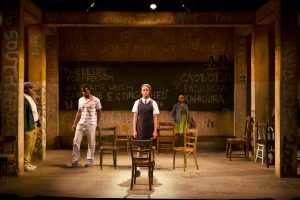
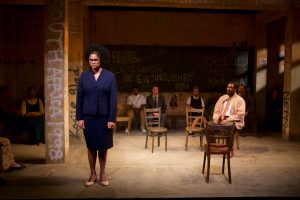

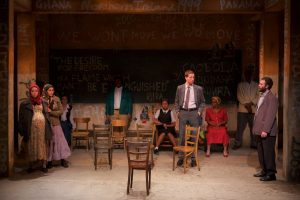
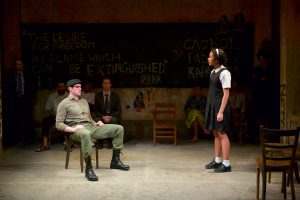
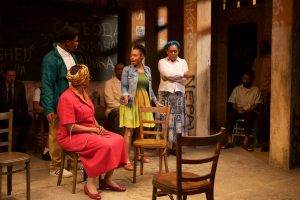

{ 4 comments… read them below or add one }
Just to help clear up some things;
The daughter from South Africa was played by Netta Walker.
There has been no resolve from the truth and reconciliation commissions presented. That is the point of the show.
Correction: 16 rubber bullets were NOT fired. Netta’s character asked Sam’s character, why 16 live rounds were fired INSTEAD of rubber bullets. She asks twice, “What happened to rubber bullets?”
To Carolyn: I believe Mr. Bommer is clear that he sees a lack of resolution as the point of the show. “But,” he says, “it’s no dramatic advantage.” Meaning, there was a time when theater used storytelling as agitation propaganda (Kramer, Odets, Brecht, Sophocles). But now, theater has become a showcase for issues over substance; and without a compelling storyline, the issues don’t stick, and the info becomes overwhelming to the point of inertia and/or apathy. At 60 minutes, this sounds more like a Frontline episode. I wonder if the creators see this as Agit-Prop and hope this play will inspire people to action. If not…what, then, is the point? Education and enlightenment? I haven’t seen the play, but would love to hear from someone who did.
Sorry about the errors in the details. That final scene was way too “sotto voce,” considering how much seemed at stake.
If the commissions’ lack of resolution, let alone reconciliation, is the point of the play’s protest, then, yes, it needs to be more decisive in explaining why these victims can’t get beyond their anger to get something like justice.
These stories just create their own quagmire.